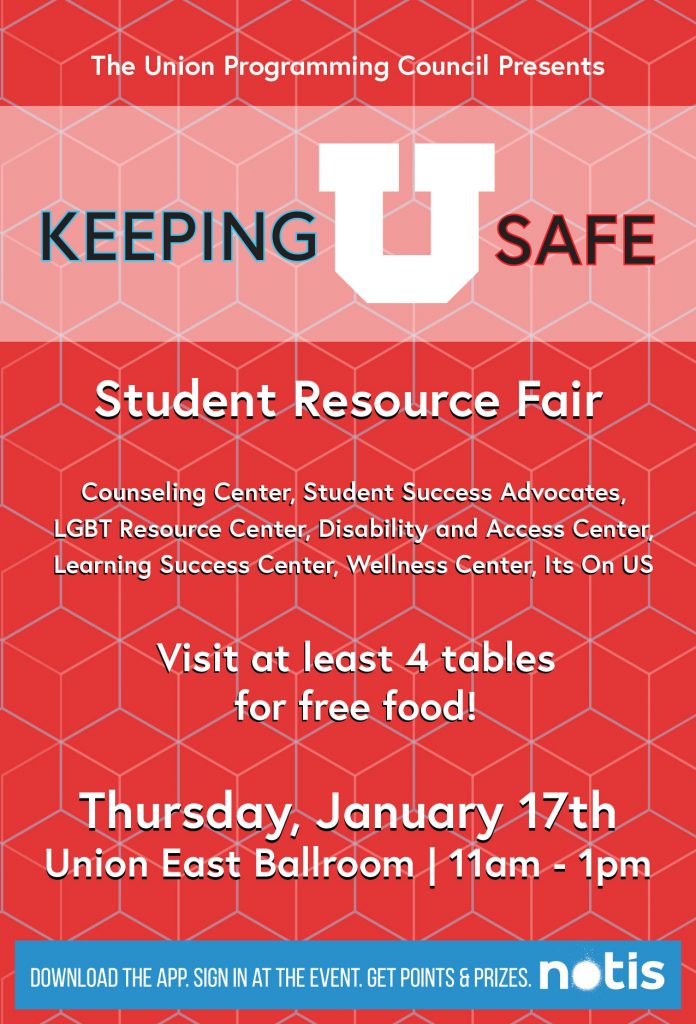Attendees will be given a stamp card. Get four stamps by visiting four tables at the event and get a free lunch.
The Union Programming Council, a group of students who organize campus events to build a sense of community, is hosting its third “Keeping U Safe” event in the Union East Ballroom, Thursday, Jan. 17, 2019, 11 a.m.-1p.m. Seven student support offices will be in attendance to share information about the resources they offer. Students who visit at least four of the tables will earn a free lunch.
“We wanted to provide a space for students to ask questions in a more personal environment and to raise awareness among students about resources they may not know about,” said Sydney Park, executive director, Union Programming Council. “After the tragic loss of one of our students last semester, we felt a resource fair was needed.”
The Union Board organized its first Keeping U Safe event in 2018 and invited campus police to speak with students about emergency preparedness. The second event focused on digital privacy and online safety and featured U law professor Randy Dryer.
 Each of the offices highlighted during the Keeping U Safe fair offer students different types of resources to support them in times of crisis. Learn more about the offices below:
Each of the offices highlighted during the Keeping U Safe fair offer students different types of resources to support them in times of crisis. Learn more about the offices below:
- The University Counseling Center provides confidential counseling to individuals, couples and groups. It also offers workshops, classes, psychiatric medication services and psychological assessments. Counseling support is available for any concerns a person wishes to discuss and aims to help people resolve existing problems, prevent potential problems and develop new skills that will enrich their lives.
- Student Success Advocates support students by working closely with them to learn about their individual needs, aspirations, and goals. They have a vast knowledge of campus and can help students identify and connect with the resources most beneficial to them.
- The LGBT Resource Center supports members of the campus community with a queer range of (a)gender and (a)sexual experiences through programming, mentorship programs, scholarships, assistance with navigating university systems and process and by offering referrals to other resources.
- The Disability and Access Center is dedicated to working with students with disabilities by providing the opportunity for success and equal access at the University of Utah. The office is committed to providing reasonable accommodations as outlined by federal and state law. It also strives to create an inclusive, safe and respectful environment across campus. By promoting awareness, knowledge and equity, it aspires to impact positive change within individuals and the campus community.
- The Learning Success Center is an academic support program designed to give students the assistance they need to have a successful academic experience. The program consists of ASUU Tutoring Services, Supplemental Instruction and Learning Strategies assistance. Students can use any of these components individually or combine them to best fit their academic needs. The center works collaboratively with other campus programs to provide learning strategies for adult learners.
- The Wellness Center aims to support students in their academic and personal wellbeing by encouraging them to consider their wellness comprehensively. The center provides health education, wellness trainings, and direct services. A variety of services are available including HIV/STI testing, wellness coaching and workshops, and Victim-Survivor Advocacy which supports survivors of interpersonal violence (i.e. sexual assault and harassment, dating and domestic violence, stalking).
- It’s On Us is a national initiative to stop sexual violence on college campuses. It’s On Us asks that all members of the university community pledge to recognize that non-consensual sex is sexual assault, identify situations in which sexual assault may occur, intervene in situations where consent has not or cannot be given, and create an environment in which sexual assault is unacceptable and survivors are supported.
